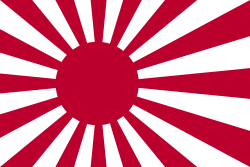Japanese Special Naval Landing Forces
|
Special Naval Landing Force (SNLF) 海軍特別陸戦隊 Kaigun Tokubetsu Rikusentai |
|
|---|---|

The ensign of the Special Naval Landing Force
|
|
| Active | 1928–1945 |
| Country |
|
| Allegiance | Emperor of Japan |
| Branch |
|
| Type | Marines |
| Role | Amphibious warfare |
| Engagements |
Sino-Japanese War Soviet-Japanese border conflicts World War I World War II |
| Commanders | |
| Notable commanders |
Commander Masajiro Hayashi |
The Special Naval Landing Forces (SNLF), (海軍特別陸戦隊 Kaigun Tokubetsu Rikusentai) were the marine troops of the Imperial Japanese Navy (IJN) and were a part of the IJN Land Forces. They saw extensive service in the Second Sino-Japanese War and the Pacific theatre of World War II.
Before the late 1920s the IJN did not have a separate marine force, instead it used naval landing forces or rikusentai formed from individual ships's crews, who received infantry training as part of their basic training, for special and/or temporary missions.
In the late 1920s the navy began to form Special Naval Landing Forces as standing regiments (albeit of battalion size). These forces were raised at — and took their names from — the four main naval districts/bases in Japan: Kure, Maizuru, Sasebo, and Yokosuka. These SNLF units saw action in China from 1932 in the January 28 Incident and at the Battle of Shanghai in naval operations along the China coast and up the Yangtze River and its tributaries during the Second Sino-Japanese War. Soon, they became involved in successful Japanese seaborne assaults throughout South East Asia.
Other SNLF were later raised from IJN personnel in China, at Hankow, and Shanghai, for service in Canton and on the Yangtze River. On 7 December 1941 there were 16 SNLF units, this increased to 21 units during the war. The strengths of each SNLF ranged from the prewar peak of 1,200 to a later 650 personnel. There was also a special detachment in the Kwantung area, garrisoning the ports of Dairen and Ryojun.
...
Wikipedia
